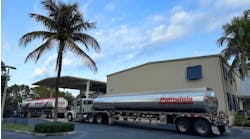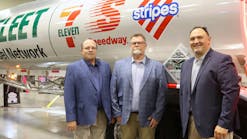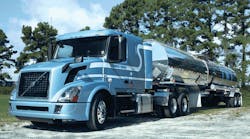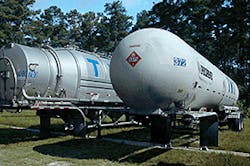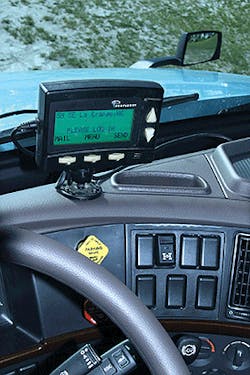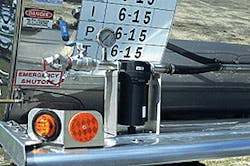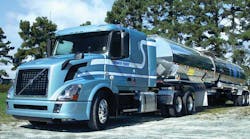Three key principles form the foundation of an award-winning safety program at Tidewater Transit
SHORTLY after establishing Tidewater Transit Co Inc more than 60 years ago, C Felix Harvey wrote down his 3As of Safety—Attitude, Attention, Alertness. These principles have formed the foundation of the tank truck carrier’s safety program ever since.
Over the years, the dedication to safe performance brought the Kinston, North Carolina-based carrier plenty of recognition from national and state groups. However, the company reached a new pinnacle this year when it was awarded the National Tank Truck Carriers Outstanding Safety Performance Trophy in the over 15 million miles category. Tidewater Transit earned the trophy with a frequency of 0.368 accidents per million miles in the 31.5 to 40 million miles class.
In the NTTC annual safety contest, Tidewater Transit also received the Grand Award for Competitive Safety in the 31.5 to 40 million miles class. David Edgerton, Tidewater Transit director of safety, was named NTTC’s Safety Professional of the Year in the over 15 million miles category.
“We’ve won a number of safety awards over the years, but this trophy goes beyond everything else,” Edgerton says. “You strive for zero accidents year after year, and then it happens. It all came together in 2014, but it is something we work on every day.
“We’ve had good safety years in the past, but this is the first time we were recognized for being at the peak of safety achievement. This is the first time we won the NTTC Outstanding Performance Trophy, and it means so much to our company.
“Tidewater Transit employees did all of the real work in winning this award. They made it happen. Those of us in management were just part of the team.”
Very satisfying
Receiving the NTTC Outstanding Performance Trophy is especially satisfying because it serves as recognition that Tidewater Transit has a safety program that is doing things the right way, according to Dave Arnold, Tidewater Transit vice-president of operations. “This helps show that we have a solid safety game plan, and we have successfully communicated that plan throughout our company,” he says. “Safety is the most important objective in our operation, and we don’t compromise that in any way. Our customers also understand that this is a win for them as well, and it is helping us build stronger partnerships.”
John Williams, Tidewater Transit vice-president of business development, adds: “We are seeing a stronger customer focus on safety, and many of them look very closely at CSA (Federal Motor Carriers Safety Administration Compliance, Safety, Accountability program) scores. Many recognize that winning this trophy is a significant achievement. Attitudes have changed, and customers are willing to pay a little more to work with a safe carrier.”
Within the company, the Outstanding Safety Performance Trophy certainly boosted morale and increased driver trust in the safety department, according to Ricky W Johnson, Tidewater Transit operations manager. “We can feel the positive attitude,” he says. “They understand even more why we demand that everything we do is accomplished in a safe and legal manner.”
Joe Clay Jones, Tidewater Transit Southeast regional sales manager, adds that safety has always been at the forefront of the Tidewater Transit operation, and the Outstanding Safety Performance Trophy has just reinforced that focus. “We’re continuing to add more safety programs, and we are all able to see that those programs are working,” he says. “We certainly would like to win this trophy again, but we know it is a competitive field. All of the top tank truck carriers are very close in safety performance. They are right on our heels, and they are also making improvements.”
The strong safety program that was already in place was a key factor that drew Edgerton to Tidewater Transit in 2011. “I already knew that they were the best in the business at what they do and had a very strong safety program,” he says.
Edgerton had already spent decades in the tank truck industry as a driver, mechanic, dispatcher, and finally safety director. A native of Goldsboro, North Carolina, he had seen the Tidewater Transit trucks for years.
Founded in 1949, the carrier had built a solid niche as a liquid and dry bulk fleet providing service throughout the 48 contiguous states and nine Canadian provinces. The carrier’s tank trailers haul petroleum, industrial chemicals, resins, adhesives, and petro-chemicals. The dry bulk fleet transports aggregates, plastic pellets and powders, salt, and recycled plastic.
The carrier currently has nearly 400 drivers on its team, including 35 owner-operators. It operates 364 company tractors and 759 tank trailers. Drivers and vehicles are dispersed among 15 terminals, most of them in the Southeast. The fleet also operates out of five transload facilities in the Southeast, including one in Fayetteville, North Carolina, that is company owned.
Trips average 370 miles. However, some drivers handling longhaul loads will stay out up to three weeks at a time. “We have diverse operations that can fit different drivers’ lifestyles,” Williams says.
Edgerton understands those drivers very well. After joining Tidewater Transit, he wasted no time getting up to speed and ensuring that the carrier remained on a winning track. Perhaps most importantly, he worked with the rest of the management to keep the safety message out in front of all employees at all times.
“There never was a time in the past few years when we were not out there preaching the safety messages,” says James Bailey, Tidewater Transit quality control manager. “Most importantly, we hold each other responsible for meeting the safety objectives.
“Everyone at this company is part of the safety program, and we have buy-in from management and drivers. Our objective is very simple—zero accidents and incidents.”
The hard work paid off with a number of awards prior to the NTTC Outstanding Safety Performance Trophy. In 2013, two years after Edgerton came on board, the carrier won the Volvo Trucks Safety Award in the over 20 million miles category.
Promoting safety
A number of programs are in place to promote driver safety, including the “Top Gun” initiative that pairs a newly hired driver with a Top Gun trainer, a hand-picked driver who oversees the training of the new driver and ensures he has the knowledge and skills needed to operate on the road. The objective is to always have at least one Top gun trainer at each terminal.
Informal meetings keep the safety message in front of drivers at all times. Tidewater Transit recognizes safe drivers with a quarterly cash bonus program, which includes presentation of certificates and plaques during company events when families are in attendance.
Tidewater Transit Co Inc page 2...
Considerable effort and care go into finding the sort of driver who shares the Tidewater Transit passion for safety. Drivers must be at least 23 years old and have a verifiable work history dating back at least 10 years. At least one year of over-the-road truck driving experience is requested, but the carrier is giving more consideration to recent graduates of professional truck driving schools.
It is also giving more consideration to military veterans. For the past two years, the carrier has been working with Johnston Community College which runs a veterans transition program at Fort Bragg, near Fayetteville, North Carolina. Truck driver training is part of the program.
“We’ve hired 15 to 20 of the graduates so far,” Edgerton says. “We’re selecting two to three per class, and most had no truck experience before entering the transition program. The people we’ve hired are doing well. Military veterans are more disciplined and less likely to jump jobs.”
When veterans are hired through the program, the carrier puts them through three weeks of additional training to teach them the Tidewater Transit system and to show them how to operate the equipment. Top Gun trainers play a big role in that process.
Field manuals cover every day of the training process for every product hauled by Tidewater Transit. It is a very structured and well-documented process for on-the-job training.
For more experienced truck drivers, the initial orientation lasts two days and covers primarily paperwork and Department of Transportation requirements. New-hire classes are small, with class sizes of just six to eight being preferred.
Instruction includes training videos that were produced in-house and are specifically focused on Tidewater Transit operations. More specific operations training takes place at the driver’s assigned terminal. Safety is stressed during every phase of the training process.
Safe equipment
One thing new drivers learn from the outset is that the vehicles in the fleet are very much a part of the safety process at Tidewater Transit. For instance, the carrier runs just Volvo tractors.
“We think Volvo is the safest truck out there, and we have believed that for a long time,” Jones says. “These trucks have so many safety features built in, such as driver air bags and bright orange seatbelts that help encourage seatbelt use.
“We’re putting more creature comforts into our new tractors, including premium driver seats. We’re currently testing Truck-Lite LED headlights on one of our tractors, and we are looking at rolling that out to the entire fleet over the next year. Drivers say they like the additional brightness and illumination distance.”
All of the tractors are set for a maximum speed of 68 miles per hour, and the newest VNLs have Volvo’s 435-horsepower D13 engine and 12-speed iShift automated transmission. Steering and tandem drive axles are from Meritor. Tractors also are specified with aluminum disc wheels and Continental tires.
On-board computers are from PeopleNet and are configured to alert management to critical events. “It ties in with Google Maps to show us where stability events occur,” Edgerton says. “We show a driver the details as part of the coaching process.”
Product handling equipment on the tractors includes Gardner Denver blowers for dry bulk loads and Blackmer pumps for liquids. Product hoses are supplied by Hart Industries Inc.
Stainless steel chemical tank trailers from Brenner and Polar typically have 7,000-gallon capacity. A number of the newer DOT407 trailers were constructed of duplex steel, which is performing well, according to Jones. The trailers have proven to be both lighter and more durable.
Chemical tank hardware includes Betts valves and domelids and Girard pressure-relief vents. A ground-level air system with a Dixon Bayco filter keeps drivers off the tanks during air offloading of cargoes.
Aluminum dry bulkers are supplied by Heil, and most of the bulkers in the fleet have capacities ranging from 1,000 to 1,600 cubic feet. Fifteen of the newest Tidewater Transit dry bulkers have a 2,300-cu-ft capacity and are used for a very lightweight product.
Propane transport range in capacity from 10,700 to 11,500 gallons. The newest MC331 trailers were supplied by Mississippi Tank Inc. Tank equipment includes trailer-mounted Blackmer pumps and Fisher valves. ♦
